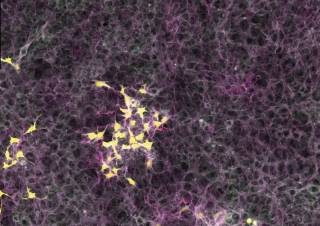Nicholas McGranahan selected as EMBO Young Investigator 2020
1 December 2020
As one of 30 new investigators selected for the prestigious EMBO programme, Dr McGranahan joins a vibrant network of researchers who have "demonstrated scientific excellence and are among the next generation of leading life scientists."

Welcoming scientists for over 20 years, the European Molecular Biology Organization (EMBO) Young Investigator programme has a global reputation for excellence. The programme annually identifies and supports some of the most promising early-career life scientists at a critical stage of their careers. EMBO Young Investigators benefit from a variety of financial, training and networking opportunities for them and their lab members over a period of four years.
Researchers chosen for the programme are selected for their outstanding scientific acheivements.
Nicholas McGranahan leads the UCL Cancer Genome Evolution Research Group and co-leads the bioinformatics within the CRUK-UCL Lung Cancer Centre of Excellence and TRACERx team at UCL. The team's research is focused on using computational methods to explore the cancer development and anti-tumour immunity within an evolutionary framework. By looking into how cancers evolve, the Group have recently explored the importance of large-scale gross chromosomal aberrations in cancer, identifying consistent patterns across tumours and also uncovering the importance of whole-genome duplications to buffer harmful alterations.
Speaking of the annoucement, Dr McGranahan said: "I feel incredibly honoured to be selected as one of this year's Young Investigators – it is really a testament to the hard work of my team and our wonderful collaborators. I'm very much looking forward to being a part of the EMBO scientific community and the opportunities to develop our work."
Further information
- EMBO press release: EMBO welcome thirty Young Investigators
- Cancer Genome Evolution Research Group - Dr Nicholas McGranahan
- Cancer Evolution and Genome Instability Lab - Prof Charles Swanton
- CRUK Lung Cancer Centre of Excellence
- TRACERx (TRAcking Cancer Evolution through therapy (Rx))
- CRUK City of London Centre
 Cancer’s ‘genome doubling’ mystery solved
Cancer’s ‘genome doubling’ mystery solved

Researchers at the Francis Crick Institute and UCL have established why some cancer cells exhibit an unusual phenomenon called whole genome doubling, where every chromosome is duplicated.
 Close
Close


